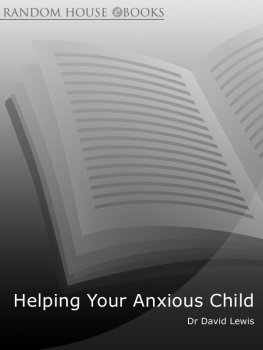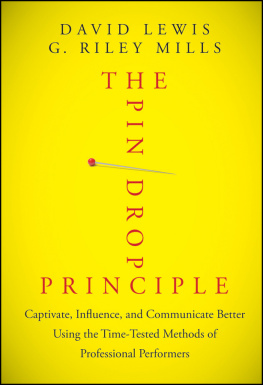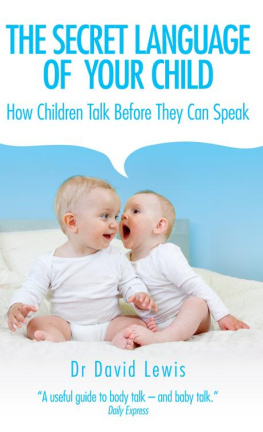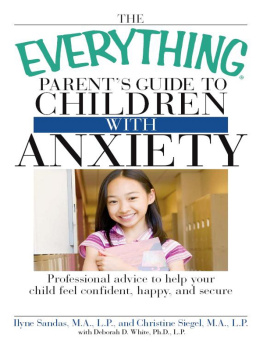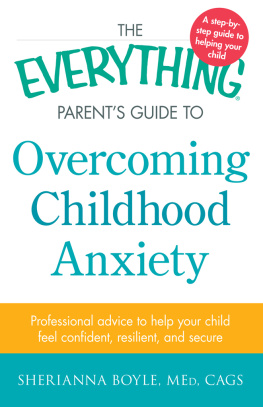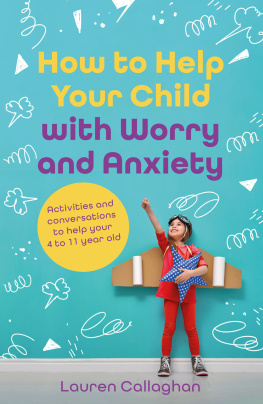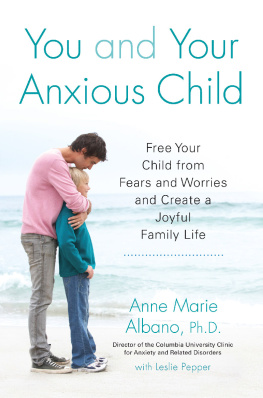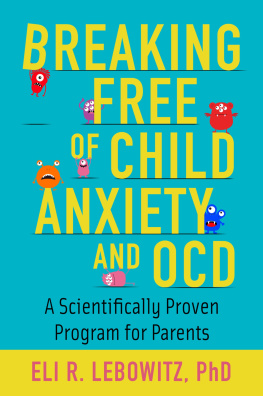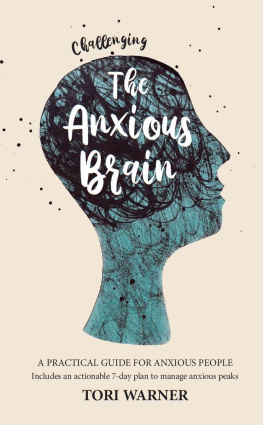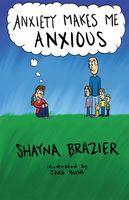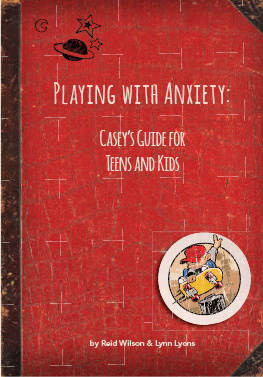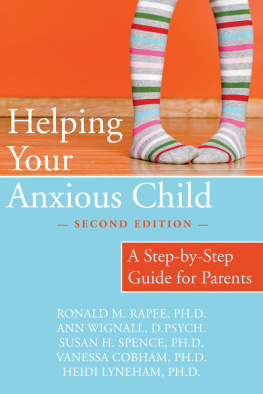Contents
About the Book
Is anxiety making your childs life a misery causing problems at school, difficulties in making friends or facing new experiences or even affecting their physical health?
Anxiety is a curse that can cast a shadow over your childs life. But there is a solution.
Chronic anxiety is a serious problem which may be general, or a specific anxiety about taking exams or doing sums, or a phobia about anything from trains or spiders to eating in public or going to the toilet. It can be treated successfully, and David Lewis offers practical and effective advice to parents of anxious children.
By applying this straightforward advice and by being positive, patient and persistent you can banish anxiety and transform your child into a happy, confident person.
About the Author
Dr David Lewis has specialised in treating anxiety and phobia conditions in adults and children for more than ten years. A lecturer in psychopathology at the University of Sussex, he is a founding trustee of Action on Phobias, a charity helping anxiety-sufferers of all ages, and a clinical director of Stresswatch, a non-profit-making organisation which advises industry on stress-related problems.
Full of calm common sense about diagnosing anxieties and coping with them, especially those associated with school: taking exams, making friends and enemies, learning maths.
Times Educational Supplement
Also by Dr David Lewis
In and Out of Love: the Mystery of Personal Attraction
Mind Skills
The Alpha Plan
Life Unlimited
You Can Teach Your Child Intelligence
How to be a Gifted Parent
The Secret Language of Your Child
Fight Your Phobia and Win
(with James Greene)
Thinking Better
Knowing Your Own Mind
Your Childs Drawings: their Hidden Meaning
Helping Your Anxious Child
AN EFFECTIVE TREATMENT FOR CHILDHOOD FEARS
David Lewis
To my mother
with love and gratitude
Introduction
This is the part of the book most people usually skip, but I ask you to take a few moments to read it, because it is going to help you make the most of what follows.
Since this is a practical book, intended to help you solve a practical problem your childs anxieties, phobias or fears it should not be read as one would a novel or detective story. There is no need to start at the first page and read in sequence to the last one. You can, of course, do this if you wish. But if your main purpose is to extract the facts needed to assist your child as quickly as possible, heres how I suggest you approach the content.
The book is divided into five parts. explain the nature of anxiety, what it is, how it arises and the various guises it may assume in your childs life. These chapters will help you understand the how and why of anxious feelings, so making it easier to appreciate the way in which fears can strike, their effect on performance, and why the practical procedures I describe can prove so effective. Although the subject is a technical one, I am confident that you will find the material easy to follow.
Like the rest of the book, the content of these chapters is based not only on clinical experience and research, but also on the talks which I have presented to thousands of parents in Europe and the USA over many years. Unlike the unfortunate reader, who if anything proves incomprehensible has no one to turn to for guidance, lecture audiences can and do protest if explanations are confused or confusing. I hope, therefore, that needless complexity and unnecessary jargon has been thoroughly purged from the text. If you do get stuck, then write to me and Ill try and help. Unlike many authors who regard corresponding with readers as a chore to be avoided, I welcome your views, suggestions, comments and queries. Please e-mail me at mail@lewisandleyser.com
are concerned with ways of discovering whether your childs difficulties really are due to anxiety and, if so, which areas of his or her life are responsible.
To conduct these investigations I have developed a number of questionnaires. While such assessments can prove very helpful, they should never be taken as providing the final word on your childs feelings. No assessment, administered at a distance through the pages of a book, can do more than provide a general indication of what may be going wrong. You should regard them not as a thermometer giving a precise temperature reading, but as a litmus paper which, by changing colour, tells one whether a substance is acid or alkaline and offers a general indication of the strength, but nothing more.
Such tests have a number of inherent weaknesses, as any psychometrician the name given to psychologists who specialise in creating tests will confirm. One of these is an understandable tendency to fake good when responding. That is, to provide not an honest answer but one which shows you in the best possible light, or supplies the kind of information it is believed that the person setting the test would wish to hear. For instance, if you were applying for a job in door-to-door selling and were asked, Would you sooner stay at home and listen to quiet music or attend a lively party? it doesnt take an Einstein to guess that saying attend a lively party will enhance your chances of landing the job.
One can get around this, to some extent, by using what are called projective tests. Here the subject is presented with an ambiguous drawing or design the most famous of these tests is probably the Rorschach Ink Blot and asked to read a meaning into it.
Unfortunately, the range of possible answers is so wide that the responses can only be interpreted on a one-to-one basis by qualified testers and even then many psychologists would argue that they are unreliable. In the course of my researches into childhood anxiety, I have developed a form of assessment that combines an element of projection your child will be asked to put himself or herself in the place of a comic strip character with a set of responses that can be more easily marked. It has proved a useful assessment that can give a good indication of both levels of anxiety and the areas of life in which these seem to be occurring. But, like all tests, it is not 100 per cent perfect, so use the information it provides as a sketch map of the emotional areas being explored, rather than as the definitive guide.
contain practical procedures for bringing the mental and physical symptoms of anxiety under control. I regard these as the essential foundations on which this home-help plan for anxieties is constructed. This makes these two chapters, in many ways, the most crucial in the book. The sooner you start working on the procedures they contain the better.
explore different areas of anxiety which, in my professional experience, cause the greatest difficulties for children. Deciding which of these to read will depend on the type of problems your child is currently experiencing. The assessments will assist in identifying these areas. For example:
Anxiety caused by | Read and use |
Attending School | Chapter Eleven |
Doing Sums | Chapter Twelve |
Taking Exams | Chapter Thirteen |
A Phobia | Chapter Fourteen |
Social Activities | Chapter Fifteen |
Sex | Chapter Sixteen |
Finally, in , I explain how to go forward once you have helped your child banish his or her anxieties and fears. This chapter should, therefore, be read no matter what specific difficulty your child has been experiencing.
Next page
